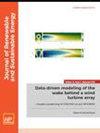风电场例行检查中无人机辅助边缘计算的队列感知计算卸载
IF 1.9
4区 工程技术
Q4 ENERGY & FUELS
引用次数: 0
摘要
将无人机(uav)和边缘计算集成到风电场例行检查中,为提高检查效率和降低运行维护成本提供了一种有前途的方法。针对无人机电池电量和计算能力有限的特点,以最小化无人机长期能耗为目标,研究了一种动态队列感知无人机辅助边缘计算检测风电场框架。利用Lyapunov优化理论将长期随机优化问题解耦为4个短期确定性子问题,包括任务拆分、无人机端计算资源分配、任务卸载和边缘服务器端计算资源分配。在此基础上,提出了一种基于Lyapunov优化的动态队列感知计算卸载算法(LODQCO),实现了任务卸载和资源分配的联合优化。通过封闭形式公式确定最优的无人机端计算资源,然后采用经典的内点法进行最优任务卸载决策。最后,通过线性优化CPLEX求解器对边缘服务器端计算资源进行寻址。仿真结果表明,LODQCO在能耗、队列积压和排队延迟方面优于基准算法。本文章由计算机程序翻译,如有差异,请以英文原文为准。
Queue-aware computation offloading for UAV-assisted edge computing in wind farm routine inspection
Integration of unmanned aerial vehicles (UAVs) and edge computing into the wind farm routine inspection provides a promising approach to enhancing inspection effectiveness and decreasing operation maintenance costs. In light of the finite battery power and computational capacity of UAVs, a dynamic queue-aware UAV-assisted edge computing inspection wind farm framework is investigated with the goal of minimizing the long-term energy consumption of UAVs. The Lyapunov optimization theory is utilized to decouple the long-term stochastic optimization problem into four short-term deterministic subproblems, including the task splitting, the UAV-side computing resource allocation, the task offloading, and the edge server-side computing resource allocation. Furthermore, a Lyapunov optimization-based dynamic queue-aware computation offloading algorithm (LODQCO) is presented to optimize task offloading and resource allocation jointly. The optimal UAV-side computing resource is determined by a closed form formula, and then the optimal task offloading decision is tackled by applying the classical interior point method. Finally, the edge server-side computing resource is addressed via a linear optimization CPLEX solver. Based on simulation results, LODQCO is superior to the benchmark algorithms with respect to the energy consumption, queue backlogs, and queuing delays.
求助全文
通过发布文献求助,成功后即可免费获取论文全文。
去求助
来源期刊

Journal of Renewable and Sustainable Energy
ENERGY & FUELS-ENERGY & FUELS
CiteScore
4.30
自引率
12.00%
发文量
122
审稿时长
4.2 months
期刊介绍:
The Journal of Renewable and Sustainable Energy (JRSE) is an interdisciplinary, peer-reviewed journal covering all areas of renewable and sustainable energy relevant to the physical science and engineering communities. The interdisciplinary approach of the publication ensures that the editors draw from researchers worldwide in a diverse range of fields.
Topics covered include:
Renewable energy economics and policy
Renewable energy resource assessment
Solar energy: photovoltaics, solar thermal energy, solar energy for fuels
Wind energy: wind farms, rotors and blades, on- and offshore wind conditions, aerodynamics, fluid dynamics
Bioenergy: biofuels, biomass conversion, artificial photosynthesis
Distributed energy generation: rooftop PV, distributed fuel cells, distributed wind, micro-hydrogen power generation
Power distribution & systems modeling: power electronics and controls, smart grid
Energy efficient buildings: smart windows, PV, wind, power management
Energy conversion: flexoelectric, piezoelectric, thermoelectric, other technologies
Energy storage: batteries, supercapacitors, hydrogen storage, other fuels
Fuel cells: proton exchange membrane cells, solid oxide cells, hybrid fuel cells, other
Marine and hydroelectric energy: dams, tides, waves, other
Transportation: alternative vehicle technologies, plug-in technologies, other
Geothermal energy
 求助内容:
求助内容: 应助结果提醒方式:
应助结果提醒方式:


